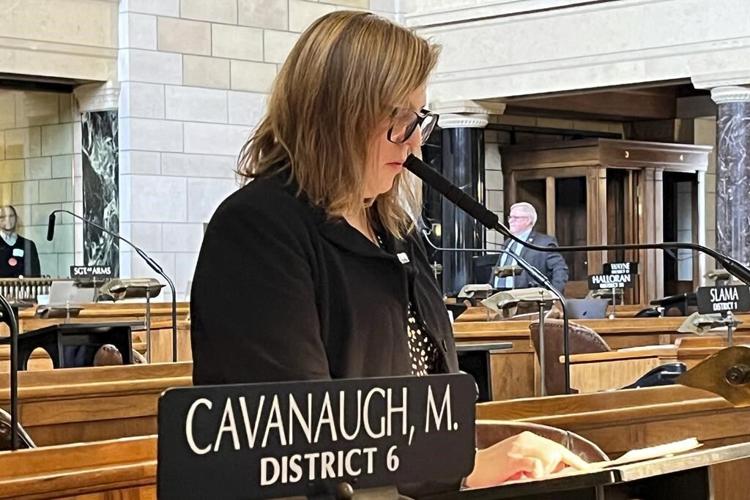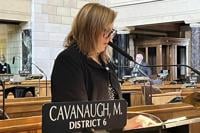LINCOLN, Neb. (AP) — The Nebraska Legislature voted Thursday to advance a contentious bill that would ban gender-affirming care for minors, despite threats from some lawmakers that they would filibuster the rest of the session.
The vote came on the , in which lawmakers angrily accused one another of hypocrisy and a lack of collegiality early on. By Thursday, the chamber had turned somber as some lawmakers opposed to the bill broke down in tears and pleaded with their Republican colleagues to reconsider their support for the bill.
“I can't stop thinking about the parents,” Sen. John Fredrickson said through sobs before reading a letter from a constituent who said her son would have likely taken his own life if he had not been able to get gender-affirming care as a teen.
Fredrickson, the first openly gay man elected to the Nebraska Legislature, expressed his heartbreak at not being able to change the outcome of the vote.
“To my LGBTQ family ... regardless of what happens today, heads up. Chins up. We're survivors,” he said.
Members of the LGBTQ community who had gathered in the Capitol to protest the bill showed their displeasure with the outcome, booing and cursing lawmakers who voted to advance it as they left the legislative floor.
“I am a ball of rage,” said Wrenn Jacobson, 29, of Lincoln, after the vote. “I've had to go back to therapy when this bill was introduced. I know so many people — so many kids — who will be hurt by this.”
“They come for the kids first,” Jacobson said. “Then they'll come for the adults.”
With the bill’s advancement, Omaha Sens. Megan Hunt and Machaela Cavanaugh every bill that comes before lawmakers for the rest of the 90-day session. By the end of Thursday's debate, other lawmakers had vowed to join that effort, including Omaha Sen. Jen Day and Lincoln Sen. Danielle Conrad.
Hunt took to the floor of the Legislature on Wednesday to confess that the debate is deeply personal for her, because her teenage son is transgender. She called the bill an affront to her as a parent and called out by name lawmakers she would hold accountable if they vote to advance it.
“If this bill passes, all your bills are on the chopping block, and the bridge is burned," she said. “I'm not doing anything for you. Because this is fake. This has nothing to do with real life. This is all of you playing government.”
The proposal had caused tumult in the legislative session long before debate began on it earlier this week. It was cited as the genesis of a nearly three-week, uninterrupted filibuster carried by Cavanaugh, who followed through on her vow in late February to filibuster every bill before the Legislature — even those she supported — declaring she would “burn the session to the ground over this bill.”
She stuck with it until an agreement was reached late last week to push the bill to the front of the debate queue. Instead of trying to eat time to keep the bill from getting to the floor, Cavanaugh decided she wanted a vote to put on the record which lawmakers would “legislate hate against children.”
The Nebraska bill, along with another that would ban trans people from using bathrooms and locker rooms or playing on sports teams that don’t align with the sex listed on their birth certificates, are among roughly that have been introduced in state legislatures this year.
Bans on gender-affirming care for minors have already been enacted several other Republican-led states, including , , and . and have bans that were temporarily blocked by federal judges.
Other states legislatures have given final approval to measures similar to the Nebraska bill, with sending a bill that would ban most gender-affirming surgeries and hormone replacement therapies for transgender minors to the governor Tuesday. In , Democratic Gov. Laura Kelly last week vetoed a similar bill. The attorney general in issued an order earlier this week to limit access to gender-affirming care for minors.
The Nebraska bill, introduced by freshman Republican Sen. Kathleen Kauth, would outlaw gender-affirming therapies such as hormone treatments, puberty blockers and gender reassignment surgery for those 18 and younger. The purpose of the bill, she has said, is to protect youth from undertaking gender-affirming treatments they might later regret as adults, citing research that says adolescents’ brains aren’t fully developed.
That position overlooks the damage taking away the option of treatments will have on teens, said 17-year-old Elliott Braatz, of Lincoln. Braatz, a transgender boy, took a day off from school to hold signs protesting the bill. He said lawmakers supporting the bill aren't taking into account that “the trans suicide rate is horrifying.”
“I'm very scared,” he said. “This bill says to people like me: 'You're trans, and that's not OK.'”
That fear was echoed by several lawmakers, including Day, who wept as she read from an email sent Wednesday to all lawmakers by a clinical psychologist in Lincoln who said calls to the clinic from trans teens reporting feeling suicidal have jumped significantly in the past week. The psychologist warned that voting to advance the bill “will result in the deaths of transgender and gender diverse adolescents, likely before the end of the school year.”
“I want all of you to go into the rotunda and look into the eyes of those parents and tell them that you're voting for this bill knowing that it could potentially kill their child,” Day said through sobs.
The bill advanced on a 30-17 vote, with two lawmakers not voting. Although bills can advance with a simple majority, it takes 33 votes to end debate to overcome a filibuster. The Nebraska Legislature is currently made up of 32 registered Republicans and 17 registered Democrats — just enough for the minority to block bills they don’t like if they stick together.
In this case, Democratic Sen. Mike McDonnell voted with Republicans to end debate and later voted to advance the bill.
“There’s a world of difference between 9 and 19," he said. “I think adult decisions should be made by adults.”
The bill will have to survive two more rounds of debate to pass in the unique one-house, officially nonpartisan Legislature. Republican Gov. Jim Pillen has said he will sign the bill into law if it reaches his desk.












































